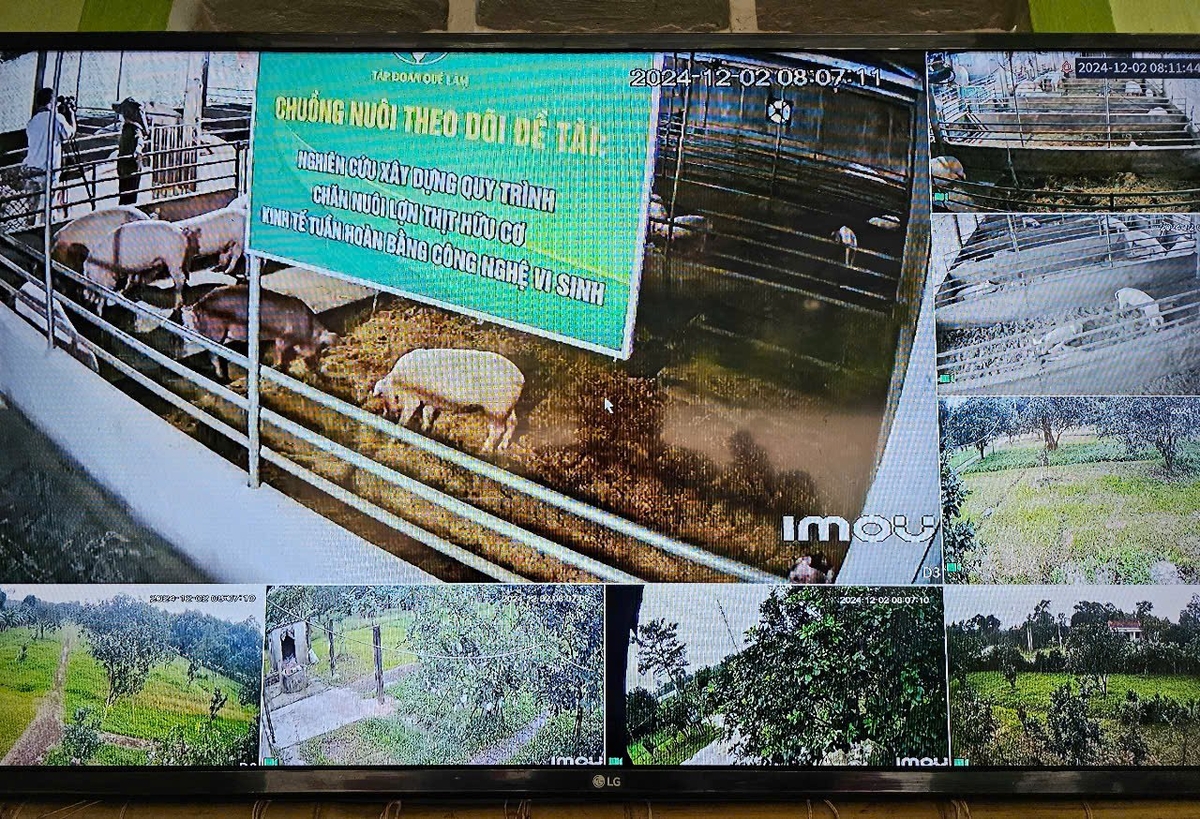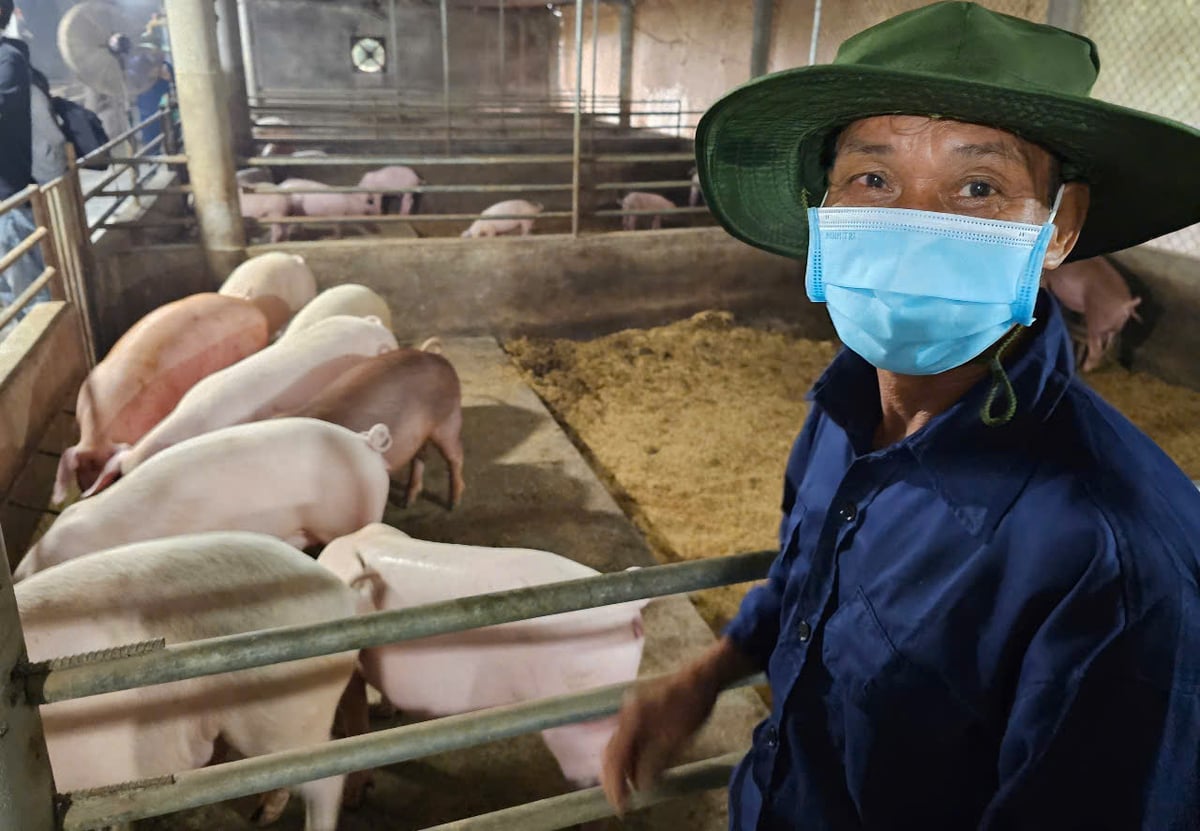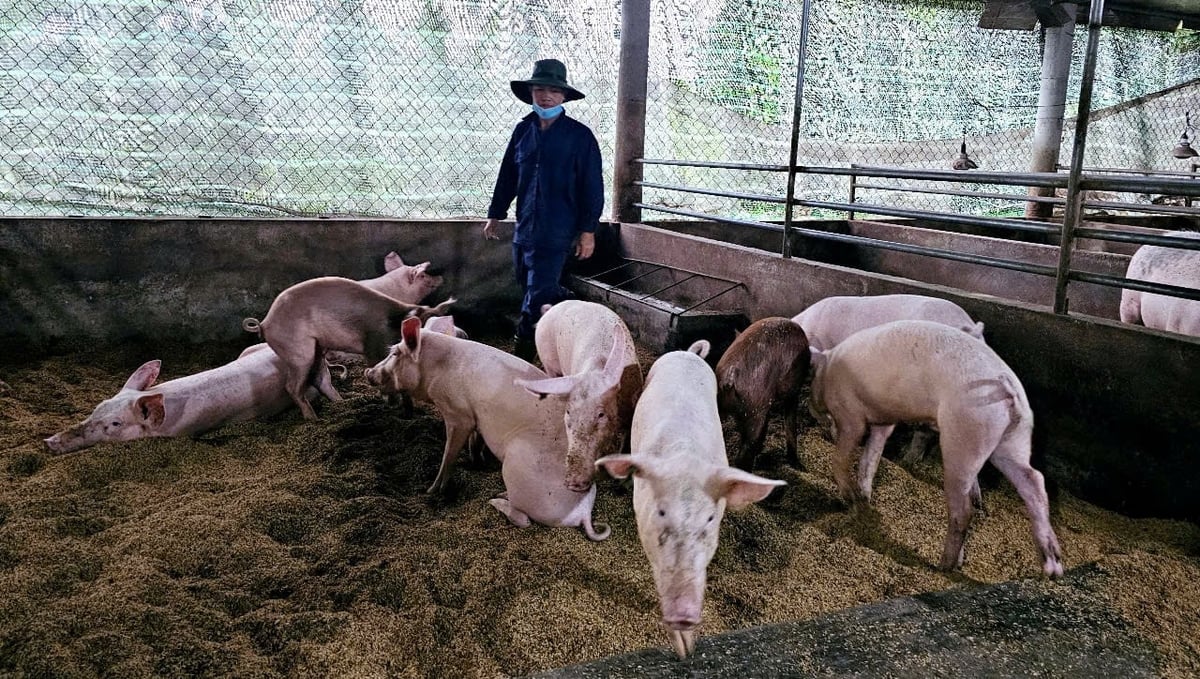December 23, 2025 | 14:29 GMT +7
December 23, 2025 | 14:29 GMT +7
Hotline: 0913.378.918
December 23, 2025 | 14:29 GMT +7
Hotline: 0913.378.918

The “5 no-s” pig raising process is closely monitored to ensure maximum efficiency. Photo: Hoang Anh.
Information from a recent report of Vietnam Circular Agriculture Association shows that it coordinated with Que Lam Group along with organizations in 2024 to build a system of households associated with organic agricultural economy, circulating economy according to the value chain. The project was implemented in many provinces and cities across Vietnam.
The chain of biosafe production chains born from the linkage of Agriculture Association is linked and Que Lam Group soon became a solution of farming households, cooperatives and small businesses. In 2024, twenty three cooperatives were built with 1,338 households; eight cooperative groups with 129 member households.
Six businesses and 100 households directly created linkages with Que Lam Group, bringing the total number of households participating in Que Lam’s circular, organic agricultural economy value chain throughout the country to 1,570 households.
From the small initial models and proof of effectiveness, the movement of raising pigs according to the “5 no-s” standard has consistently spread in localities from North to South. In the provinces of Phu Tho, Vinh Phuc, Bac Giang, Lai Chau, Ha Tinh, Quang Binh, Hue City, Dong Nai, and Soc Trang, the total herd of cattle and poultry in farms applying organic, circulating economy has increased to 484 sows and 7,385 porkers. The organic breeding model for other livestock such as cows, ducks, and chickens is continuously expanded.
Hoang Minh Tam was the first person to shift from traditional breeding to organic, biosafe livestock production in Yen Lap district, Phu Tho province. “At the end of 2021, I was fortunate to visit the livestock and cultivation models of Que Lam Group and really happy to find the livestock method I wanted, producing without polluting the environment unlike the traditional ways, creating clean products and bringing value to the community,” he said.
With a barn area of approximately 300m2, in 2024, Tam's family raised 105 porkers according to the “5 no-s” standard: no lean substances, no watering, no industrial food, no growth stimulants, and no environmental pollution.
Subtracting the investment cost, each pig helps the family earn VND 1.5 - 2 million in profit. Thanks to the use of microbiological technology in breeding, he also obtains 24 tons of mattresses. He sells 14 tons to the company and uses the rest as a source of fertilizer for the garden.

Raising pigs according to the “5 no-s” standard shows 5 visible benefits. Photo: Hoang Anh.
In a similar case, Vo Van Thang, a pioneer in Cam Minh commune (Cam Xuyen district, Ha Tinh province), also made the decision to convert from traditional models to farming in an organic direction with Que Lam Group.
Deployed for 3 years, starting with the original model of only 5 sows and 100 porkers, Thang slowly achieved high proficiency in breeding techniques and effective economic, social and environmental efficiency. He then boldly increased the size of the herd to 10 sows and 200 pigs/year.
In the process of raising pigs according to the organic value chain, Thang found five very practical benefits:
Firstly, this is a progressive breeding process and has been proven to be effective. It is very easy to implement on a household scale.
Secondly, biosafe farming helps families save time and costs since the cages are not cleaned by using water, every day it only takes nearly 3 hours to take care of the livestock and fix the mattresses in the barn.
Thirdly, this approach ensures the surrounding environmental sanitation thanks to the use of probiotics in pig feed. Pig poop is also treated through probiotics, thus eliminating odors. Farmers do not have to bathe pigs or clean the cages with excessive water, avoiding the risk of environmental pollution or disease.
Fourthly, the organic livestock production models can make full use of organic resources for fertilizing, good for growing vegetables and fruit trees.
Fifth, this model helps pigs grow well, absolutely no disease detected. Cam Minh commune recently suffers from African swine fever and other diseases, pushing the death rate of sick pigs to over 90%, but thanks to the organic model, the pigs in Thang’s barn remain safe.

Biosafe livestock production is an effective solution for household farming. Photo: Hoang Anh.
Nguyen Hong Lam, Chairman of the Board of Directors of Que Lam Group, Chairman of Vietnam Circular Agriculture Association, the "father" of the “5 no-s” pig farming standard said, “Stemming from the reality of more than 30 years of accompanying farmers, I understand that in order to teach farmers to do agriculture, we must have a model and a set of solutions. We must let farmers see practical benefits and realistic efficiency, and then they change and follow. By building models that have been summarized by practical science, we wish to create a set of animal husbandry solutions aiming towards farming households, cooperatives, and small businesses.”
Translated by Samuel Pham

(VAN) The 2025 Joint Response Plan (JRP) identifies three core priorities and calls for $96.2 million to support disaster recovery for 1.4 million people.

(VAN) Risk assessment methodology enables early risk identification, rational resource allocation, and the development of control measures tailored to the food value chain.

(VAN) Once considered a waste product to be burned, rice straw in the Mekong Delta is now being collected and processed through mechanization and biotechnology, paving the way for a sustainable circular agricultural model.

(VAN) Risk assessment in food safety management not only helps protect public health but also promotes sustainable development.

(VAN) Prime Minister chaired the 26th meeting of the National Steering Committee on Illegal, Unreported, and Unregulated (IUU) Fishing.

(VAN) Cuba is currently streamlining procedures to attract investors, with many new policies shaped by the practical experiences of Vietnamese projects operating in the country.

(VAN) Patrol Team No. 15 has been executing patrol, inspection, and control duties in the Southwest waters, a region identified as having a high risk of violations.